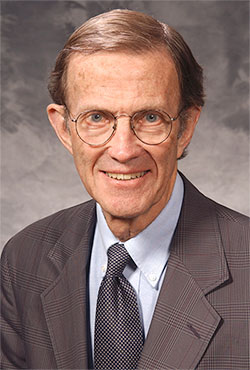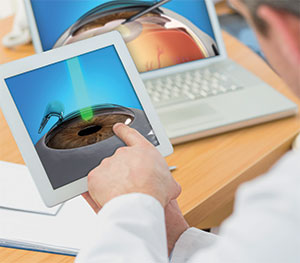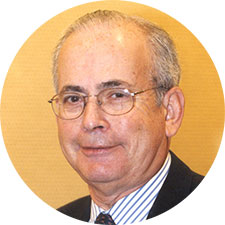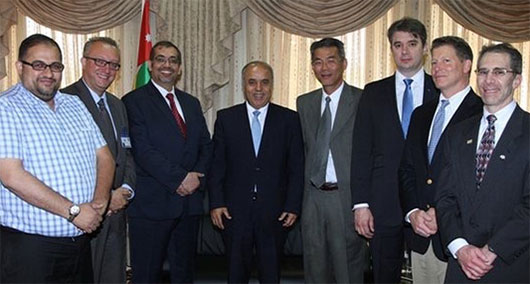Download PDF
WHAT’S HAPPENING
This Year’s Laureate: Matthew D. Davis, MD
The Board of Trustees of the Academy is proud to announce Matthew D. Davis, MD, as the recipient of the Laureate Recognition Award for 2016.

ACADEMY LAUREATE: MATTHEW D. DAVIS, MD. The Laureate Recognition Award honors physicians who have made the most significant contributions to ophthalmology leading to the prevention of blindness and restoration of sight worldwide.
Chaired the Diabetic Retinopathy Study. Dr. Davis is known for his groundbreaking work in diabetic retinopathy clinical trials, beginning with his position as the national chair for the Diabetic Retinopathy Study (DRS). DRS began in 1971 and was the first major clinical trial funded by the National Eye Institute (NEI). In 1976, Dr. Davis and his collaborators published a seminal paper based on DRS findings, showing the substantial effect that scatter laser photocoagulation had in treating diabetic retinopathy. Dr. Davis also chaired the follow-up trial, the Diabetic Retinopathy Vitrectomy Study, which demonstrated that vision was significantly better for some patients with very severe diabetic retinopthy if they had early vitrectomy surgery, as opposed to deferring surgery. These trials created standard of care treatments that are still used, and are models of clinical research.
Founded Wisconsin’s Fundus Photography Reading Center (FPRC). Another of Dr. Davis’ achievements was the 1970 establishment of the University of Wisconsin FPRC, the first centralized, independent reading center for randomized clinical trials of retinal diseases. The staff at FPRC work with clinical researchers from around the world to analyze photographs of the retina and assess changes over time. Dr. Davis and his collaborators developed photographic standards and systems for analyzing the characteristics of the lens and retina, and designed quality-control systems to increase accuracy and assess reproducibility. The FPRC continues to participate in clinical research, and it provides image analysis for trials sponsored by the NEI as well as pharmaceutical companies.
Classified diabetic retinopathy and AMD. Dr. Davis and his collaborators developed the modified Airlie House classification of diabetic retinopathy and, later, the Early Treatment Diabetic Retinopathy Study severity scale, as well as the Age-related Eye Disease Study scales for Age-related Macular Degeneration. These scales have been widely used in the study and management of these disorders.
A lifetime of service. Dr. Davis has served on the Medical Advisory Board of the Juvenile Diabetes Foundation (1973-1976), the Visual Sciences Study Section of the National Institutes of Health (1975-1978), the Vision Research Review Committee of the National Eye Institute (1979-1981, 1989-1994), and the National Diabetes Advisory Board at the National Institute of Arthritis, Diabetes and Digestive and Kidney Diseases (1981-1984). He has received a number of medals and awards in ophthalmology, including the Mildred Weisenfeld Award from the Association for Research in Vision and Ophthalmology in 1989, the Arnall Patz Medal from the Macula Society in 1992, and the Howe Medal from the American Ophthalmological Society in 2006. He has also authored or coauthored more than 200 peer-reviewed articles.
Honored in Chicago. In recognition of Dr. Davis’ contributions, the Academy will honor him as the 2016 Laureate during the Opening Session of AAO 2016.
At AAO 2016, read an interview with Dr. Davis in Academy News.
ACADEMY STORE
Save Time With Patient Education Videos
Free up time in your busy schedule and improve patient flow by showing 3- to 5-minute videos of conditions and treatment options explaining benefits, risks, and alternatives. The Academy’s OMIC-reviewed downloadable patient videos reduce repetitive verbal explanations so you can focus one-on-one discussions on patients’ specific questions and concerns. The following subspecialties are available: cataract and refractive surgery, glaucoma, oculoplastics, pediatrics, and retina. Save 30% when you order 4 or more videos.

PUT YOUR PATIENTS’ MINDS AT EASE. Relieve patients’ anxieties while setting realistic expectations for them about their conditions.
For more information and to order, visit www.aao.org/store.
TAKE NOTICE
EyeCare America Offers Discount Drug Card
The Academy’s EyeCare America (ECA) program, in partnership with NeedyMeds, is offering a new drug discount card to individuals, groups, and businesses. No membership or registration is required, and the card never expires. It is accepted at more than 65,000 pharmacies nationwide, including all major chains. Practices and other organizations that tailor the card with their group name and logo will receive monthly card usage reports to track the pharmacies used, drugs purchased, savings gained, and more. Several state ophthalmological societies, including those in New York, Illinois, Kansas, and Maryland, have customized cards with their name and logo to give to their members and legislators.
Who can use this card? Anyone can use this card as often as needed; however, the card cannot be combined with other insurance plans such as Medicare, Medicaid, or any state or federal prescription insurance.
What if I have insurance? You can use the card instead of insurance if any of the following apply:
- A drug isn’t covered by your insurance.
- Your insurance has no drug coverage.
- You have a high drug deductible.
- You have met a low medicine cap.
- The card offers a better price than your copay.
- You are in the Medicare Part D donut hole.
What is covered? Prescription drugs, medical supplies, and over-the-counter medications are covered if written on a prescription blank. Some pet prescription medications purchased at a pharmacy may also be covered.
To order complimentary cards for your practice, email eyecareamerica@aao.org.
For more information, visit www.aao.org/eyecare-america/resources/medication-assistance.
Ask the Ethicist: Appropriate Compensation for Expert Witness Testimony
Q: I have been asked to review medical records for an attorney. What is the standard payment for an ophthalmologist reviewing a case as an expert witness? What about fees for a deposition or testifying at trial?
A: Unfortunately, the Academy cannot provide specific advice to any member on the issue of fees. There is no official fee schedule, and there are no hard-and-fast rules. There are, however, a few things to consider.
Before you start. Find out if your employer has a policy about serving as an expert. Some practices and institutions expect that any fees earned from outside activities must go to the employer.
What to charge. Some physicians who offer expert testimony charge what they would have earned during a routine practice day. Others set one hourly rate for reviewing records and writing a report, and a different hourly rate for actually providing testimony in a deposition or court appearance. Some physicians even charge for a whole day rather than just the hours required for a court appearance. Your travel expenses, if any, also should enter into your calculations. Your fees should not exploit parties to the litigation, and ultimately you should only accept compensation that is fair and is commensurate with the time and effort involved. You should never coordinate fees with other potential experts because doing so is a violation of antitrust laws. Finally, under Rule 16 of the Code of Ethics, it is unethical for a physician to accept compensation that is contingent upon the outcome of litigation.
If you decide to take on the work, make sure—before you get started—that your fees are clear to the attorney who hires you and that you obtain a signed agreement for payment for services rendered. When setting your fees for reviewing records and providing testimony, be sure to take the following into account:
- Percentage of your time serving as an expert witness
- Your hourly fee
- Percentage of time spent reviewing transcripts of depositions and trial testimony
Academy resources. The Ethics Committee has documents that relate to providing expert testimony. Rule 16 of the Code of Ethics addresses ethical expert witness testimony.
For more information or to submit a question, contact the Ethics Committee at ethics@aao.org.
PASSAGES
Elliot M. Finkelstein, MD

Dr. Finkelstein.
Dr. Finkelstein, Academy past president, passed away on June 5. He was 81.
Dr. Finkelstein received his bachelor’s degree from Harvard College, attended medical school at University of Washington School of Medicine, and completed his residency at Baylor College of Medicine. He helped lead the merging of the Academy’s Committee for State Governmental Affairs and its Committee for State Organizational Development into the new Secretariat for State Affairs, and served as its secretary from 1992 to 1996. Dr. Finkelstein was Academy president in 1998, and he focused his efforts that year on communicating the value of ophthalmology. In his address as president-elect, he said, “We must use all the resources at our disposal to keep ophthalmology from becoming devalued. …We must not let anything deter us from carrying out what we have promised: to bring to our patients the highest care available.”
He also served on many Academy committees, including the Ethics Committee (2001-2005), EyeCare America Steering Committee (2000-2008), State Society Advisory Committee for EyeCare America (2000-2008, as chair), and State Affairs Committee (1986-1992, the last 2 years as chair).
“Elliot was above all else a genuine and caring clinician, and that perspective drove everything he did,” noted David W. Parke II, MD, Academy CEO.
MEMBERS AT LARGE
New York and Jordan Societies Come Together
Amjad M. Hammad, MD, MBA, president-elect of the New York State Ophthalmological Society (NYSOS), teamed with Issam Al-Bataineh, MD, President of the Jordanian Ophthalmology Society (JOS) and Ahmad Al-Shobaki, MD, chairman of the JOS scientific committee, in creating the first International Jordanian American Congress of Ophthalmology. The meeting took place June 2-4 at Le Meridien in Amman, Jordan. More than 400 ophthalmologists from Jordan, Egypt, Iraq, Lebanon, Palestine, the United Arab Emirates, Saudi Arabia, the United Kingdom, and the United States attended. NYSOS past president Steven Awner, MD, and Academy Secretary for Communications Philip R. Rizzuto, MD, FACS, were among the faculty who traveled from the United States.
The congress featured plenary lectures delivered by local, regional, and international speakers in addition to free papers, posters, and workshops. Dr. Awner gave the NYSOS welcoming remarks during the opening ceremony, kicking off the 4-day scientific program, which included 137 presentations and didactic courses on topics in all subspecialty areas. In addition to education, an exciting social and exhibition program was developed by a team led by chairman Qassem M. Obeidat, MD. Among the social events offered were tours of Petra (the “2nd of the 7 world wonders”), desert castles, Madaba, Mount Nebo, the Dead Sea, Baptism Site, and an Amman city tour.
“We are very excited, as we are accomplishing several goals. We are building closer ties to ophthalmology in the Middle East and helping improve health care quality and patient care on a global basis,” said Dr. Hammad.
Dr. Hammad looks forward to NYSOS continuing this new collaboration. During this visit, the NYSOS delegation was invited to meet with the President of the University of Jordan, Azmi Mahafzah, MD, PhD, and the Dean of its School of Medicine, Islam Massad, MD, to discuss possible cooperation and joint ventures with New York medical colleges. Another joint conference is planned for Feb. 22-25, 2017, in Dubai.
 |
|
JOINING FORCES. State and international society leaders join forces to create the first International Jordanian American Congress of Ophthalmology. From left to right: Mohammad Hammad, DDS, professor of dentistry, University of Jordan; Dr. Massad; Dr. Hammad; Dr. Mahafzah; Charles H. Rheeman, MD; Gareth M. Lema, MD, PhD; Dr. Rizzuto; and Dr. Awner.
|
D.C. REPORT
Host a Lawmaker This Month
Lawmakers traditionally return to their home districts for the month of August. They spend this time reconnecting with their constituents to identify issues to bring back to Congress when it reconvenes for the fall. Use this opportunity to invite your federal and state leaders to your practice—show them what it’s like to be an ophthalmologist, and give them the opportunity to meet their constituents who rely on quality, life-changing eye care.
The Academy has a series of materials to help you plan for a site visit. Go to www.aao.org/local to learn the following:
- What local and federal lawmakers consider when deciding whether to attend local events
- The do’s and don’ts for hosting
- How to tailor the site visit to the member of Congress or state legislator
By hosting an hour-long visit at your practice, ambulatory surgery center, or academic setting, you give elected leaders the solid foundation they need to understand issues critical to our patients and profession. Be sure to take advantage of this window of opportunity.